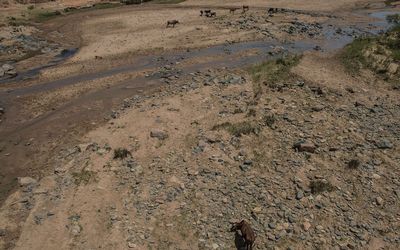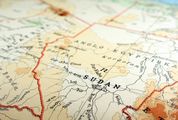LICHTENBURG — Protectionism and smuggling routes are blooming across Africa, instead of corn and cassava, as a record drought pushes countries to hoard grain and drives more than 30-million people towards hunger.
The ocean-warming phenomenon known as El Niño is extending Africa’s worst dry spell in three decades, raising the spectre of a second poor harvest in many countries.
Africa’s intensifying food crisis is just one manifestation of El Niño’s advance. An abnormally severe dry season stoked the devastating fires that covered Indonesia and its neighbours in smoke in November. California fruit farms and Brazil sugar plantations are bracing for the violent rains El Niño conditions typically bring to their shores.
The extent to which these droughts and deluges are being exacerbated by climate change was debated by leaders from every country this month in Paris. On Saturday, they reached a landmark agreement to cut emissions and hold the global temperature increase to no more than an average of 2°C (3.6°F). They also agreed to funnel more than $100bn annually to developing countries to make it happen.
The deepening drought is the latest drag on Africa’s economic rise. Plunging commodity prices and the slowdown in China, the continent’s top trade partner, have pushed growth to its lowest level since the global financial crisis.
In South Africa, this year has been the driest on Derek Mathews’ farm 140 miles west of Johannesburg since 1929, when his grandfather ran it.
"You forget it could ever rain again," he said recently, picking up a handful of dusty soil and letting it drift through the hot wind. Little sand dunes were forming over the dirt road between fields where he has planted peanuts, soybeans and corn: "It’s grim."
As a result, South Africa is importing corn for the first time in seven years from places such as the US. Countries that buy South Africa’s surplus grain, such as Zimbabwe and Swaziland, are importing pricier substitutes from the same global markets.
Thanks to the continent’s colonial division into more than 50 countries, most African economies are built around commodity exports to the developed world or China in exchange for finished goods. Just 10% of Africa’s trade passes between countries on the continent. Zimbabwe and Tanzania have banned grain exports. Zambia is thinking of doing the same.
Such restrictions would weigh heavily on increasingly famished countries like Malawi, the world’s poorest according to the World Bank, and war-racked South Sudan. Even Ethiopia, a fast-growing economy that has attracted investors from Europe and China, is struggling to feed more than 15-million people as the drought deepens. The new trade restrictions contradict frequent promises from African leaders to unlock economic potential by trading more with each other.
An alphabet soup of acronym-bearing trade blocs aim to change that. In June, leaders from 26 countries in East and Southern Africa vowed to build one free-trade zone with around 600-million people. The intended zone includes the countries hardest hit by the current drought and those blocking the sale of grain beyond their borders, showing how bold promises of regional integration remain distant.
"If you try to keep grain in your country artificially, farmers won’t plant next year and then you have a bigger problem," said industry trade group Grain SA chief executive Jannie de Villiers. "High prices can only be cured by incentivising more farmers to grow."
Instead, the trade blockages are creating a business opportunity for traders like Abdul Sayuni who are buying up grain from relatively bountiful countries such as Tanzania and Zambia and shipping it to harder-hit countries — at a steep profit.
By 9am each morning, Mr Sayuni is filling orders at his unmarked storefront in Kampala to move grain across Uganda’s porous border from sellers in Tanzania to buyers in Ethiopia and South Sudan.
Mr Sayuni abandoned his timber-trading business in favour of illicit grain in April as drought pushed food prices up 40% across the region. He said he has earned more than $20,000 since then, more than he made in three years of selling timber.
"As long as the stocks keep coming, I want to keep in this business," the 35-year-old father of three said with a giddy smile.
At least 1,000 metric tons of grain is being smuggled daily through Uganda to drought-stricken countries including Ethiopia, Kenya and South Sudan, officials at Uganda’s commodities exchange estimate. Dicksons Kateshumbwa, a Ugandan customs official, said the 250-mile border between Tanzania and Uganda is too remote for police to patrol adequately, making it a favourite conduit for smugglers.
Months after harvests across the region plummeted by a third, the illicit trade is stoking calls for tougher export restrictions in places like Zambia.
"Foreigners are buying up all the available corn at inflated prices, leaving local millers with virtually no stock," says Allan Sakala, the head of a millers’ organisation in Zambia that recently raised its prices by 25%. "If exports are not banned, consumers should brace for even higher prices."
President Edgar Lungu in November accused millers of exploiting consumers and said he might freeze grain prices, as his government struggles to stabilise a runaway currency and economy suffering from the global drop in prices for copper, its top export.
Along Uganda’s southern border with Tanzania, rickety trucks carry 50kg bags of corn and beans across several unmanned crossings, traders said. The cargo sits in secret caches near the border town of Mutukula before being loaded onto larger trucks for the trip through Kampala to Kenya, South Sudan and Ethiopia. Ali Mukalazi, another smuggler in Kampala, said some of the corn is graded and repackaged to look like a legal Uganda-grown export. Mr Mukalazi said he sometimes bribes customs officials "to keep out of trouble".
He said those payments hardly eat into his profit. "The margins are quite handsome. I am sure many people would love to be in my position."
More Africa news from The Wall Street Journal
More news from The Wall Street Journal
Premium access to WSJ.com: $1 a week for 12 weeks

Emaciated cattle roam through the dried up Mfolozi River in Ulundi in Kwa Zulu Natal, as a severe drought affects South Africa. Picture: AFP/MUJAHID SAFODIEN
LICHTENBURG — Protectionism and smuggling routes are blooming across Africa, instead of corn and cassava, as a record drought pushes countries to hoard grain and drives more than 30-million people towards hunger.
The ocean-warming phenomenon known as El Niño is extending Africa’s worst dry spell in three decades, raising the spectre of a second poor harvest in many countries.
Africa’s intensifying food crisis is just one manifestation of El Niño’s advance. An abnormally severe dry season stoked the devastating fires that covered Indonesia and its neighbours in smoke in November. California fruit farms and Brazil sugar plantations are bracing for the violent rains El Niño conditions typically bring to their shores.
The extent to which these droughts and deluges are being exacerbated by climate change was debated by leaders from every country this month in Paris. On Saturday, they reached a landmark agreement to cut emissions and hold the global temperature increase to no more than an average of 2°C (3.6°F). They also agreed to funnel more than $100bn annually to developing countries to make it happen.
The deepening drought is the latest drag on Africa’s economic rise. Plunging commodity prices and the slowdown in China, the continent’s top trade partner, have pushed growth to its lowest level since the global financial crisis.
In South Africa, this year has been the driest on Derek Mathews’ farm 140 miles west of Johannesburg since 1929, when his grandfather ran it.
"You forget it could ever rain again," he said recently, picking up a handful of dusty soil and letting it drift through the hot wind. Little sand dunes were forming over the dirt road between fields where he has planted peanuts, soybeans and corn: "It’s grim."
As a result, South Africa is importing corn for the first time in seven years from places such as the US. Countries that buy South Africa’s surplus grain, such as Zimbabwe and Swaziland, are importing pricier substitutes from the same global markets.
Thanks to the continent’s colonial division into more than 50 countries, most African economies are built around commodity exports to the developed world or China in exchange for finished goods. Just 10% of Africa’s trade passes between countries on the continent. Zimbabwe and Tanzania have banned grain exports. Zambia is thinking of doing the same.
Such restrictions would weigh heavily on increasingly famished countries like Malawi, the world’s poorest according to the World Bank, and war-racked South Sudan. Even Ethiopia, a fast-growing economy that has attracted investors from Europe and China, is struggling to feed more than 15-million people as the drought deepens. The new trade restrictions contradict frequent promises from African leaders to unlock economic potential by trading more with each other.
An alphabet soup of acronym-bearing trade blocs aim to change that. In June, leaders from 26 countries in East and Southern Africa vowed to build one free-trade zone with around 600-million people. The intended zone includes the countries hardest hit by the current drought and those blocking the sale of grain beyond their borders, showing how bold promises of regional integration remain distant.
"If you try to keep grain in your country artificially, farmers won’t plant next year and then you have a bigger problem," said industry trade group Grain SA chief executive Jannie de Villiers. "High prices can only be cured by incentivising more farmers to grow."
Instead, the trade blockages are creating a business opportunity for traders like Abdul Sayuni who are buying up grain from relatively bountiful countries such as Tanzania and Zambia and shipping it to harder-hit countries — at a steep profit.
By 9am each morning, Mr Sayuni is filling orders at his unmarked storefront in Kampala to move grain across Uganda’s porous border from sellers in Tanzania to buyers in Ethiopia and South Sudan.
Mr Sayuni abandoned his timber-trading business in favour of illicit grain in April as drought pushed food prices up 40% across the region. He said he has earned more than $20,000 since then, more than he made in three years of selling timber.
"As long as the stocks keep coming, I want to keep in this business," the 35-year-old father of three said with a giddy smile.
At least 1,000 metric tons of grain is being smuggled daily through Uganda to drought-stricken countries including Ethiopia, Kenya and South Sudan, officials at Uganda’s commodities exchange estimate. Dicksons Kateshumbwa, a Ugandan customs official, said the 250-mile border between Tanzania and Uganda is too remote for police to patrol adequately, making it a favourite conduit for smugglers.
Months after harvests across the region plummeted by a third, the illicit trade is stoking calls for tougher export restrictions in places like Zambia.
"Foreigners are buying up all the available corn at inflated prices, leaving local millers with virtually no stock," says Allan Sakala, the head of a millers’ organisation in Zambia that recently raised its prices by 25%. "If exports are not banned, consumers should brace for even higher prices."
President Edgar Lungu in November accused millers of exploiting consumers and said he might freeze grain prices, as his government struggles to stabilise a runaway currency and economy suffering from the global drop in prices for copper, its top export.
Along Uganda’s southern border with Tanzania, rickety trucks carry 50kg bags of corn and beans across several unmanned crossings, traders said. The cargo sits in secret caches near the border town of Mutukula before being loaded onto larger trucks for the trip through Kampala to Kenya, South Sudan and Ethiopia. Ali Mukalazi, another smuggler in Kampala, said some of the corn is graded and repackaged to look like a legal Uganda-grown export. Mr Mukalazi said he sometimes bribes customs officials "to keep out of trouble".
He said those payments hardly eat into his profit. "The margins are quite handsome. I am sure many people would love to be in my position."
More Africa news from The Wall Street Journal
More news from The Wall Street Journal
Premium access to WSJ.com: $1 a week for 12 weeks






















Change: 0.54%
Change: 0.60%
Change: 2.06%
Change: 0.36%
Change: -0.17%
Data supplied by Profile Data
Change: 1.13%
Change: 0.72%
Change: 0.54%
Change: 0.00%
Change: 0.78%
Data supplied by Profile Data
Change: -0.95%
Change: -0.98%
Change: -1.19%
Change: -1.28%
Change: -0.23%
Data supplied by Profile Data
Change: -0.44%
Change: 1.02%
Change: 0.65%
Change: 3.32%
Change: 2.30%
Data supplied by Profile Data